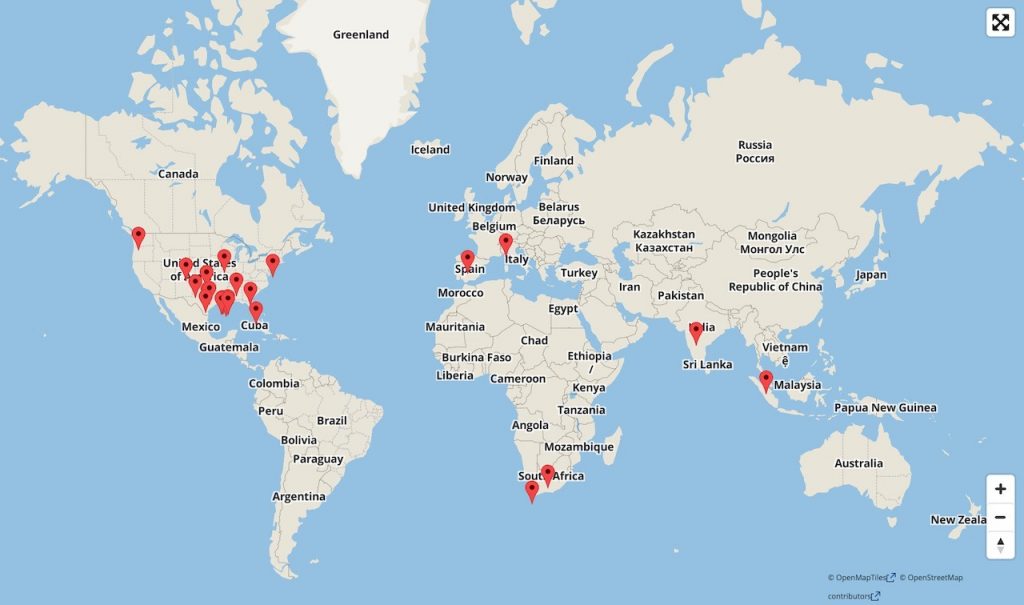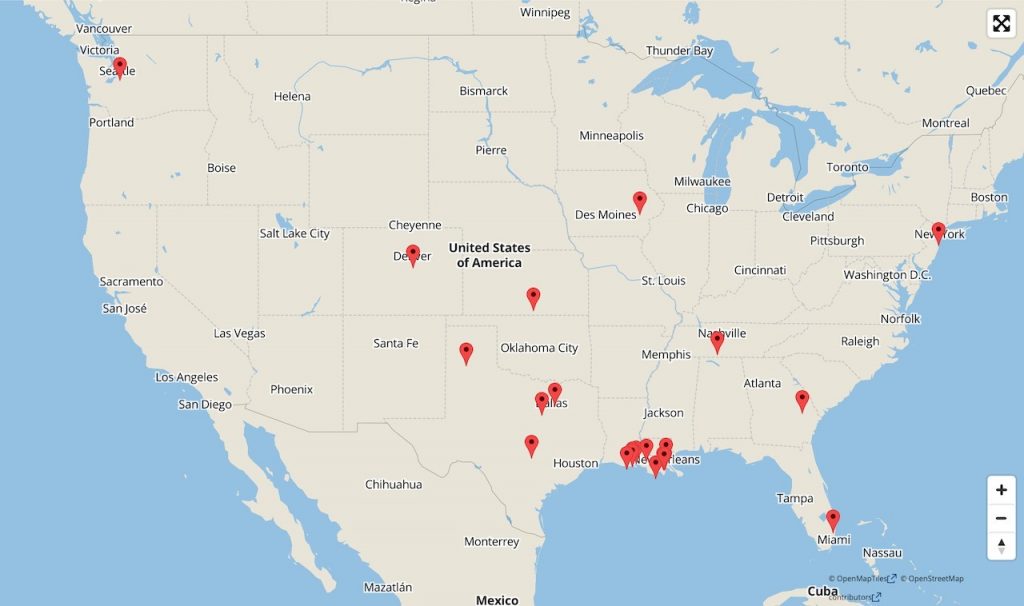UPDATE – 6 MAR 2020
As of 6 Mar 2020, it appears that the Education for Living Seminars (ELFSeminars.com) website is no longer in existence. We have a full HTML archive of the site as it was on 27 Oct 2014 when this article was written. So if that would be of help to you in your research, please contact us for assistance.
You can view the old site content on the Internet archives. [View] You’ll find the quality of the archived site is compromised by the fact that some images will be missing. Our HTML archive would be better quality. The links found below on this page have been updated to direct you to the archived pages of the site.
On her LinkedIn page, Laurie Riquelmy is listed as the CEO and owner of Education for Living Seminars from May 1995 to May 2013. At the bottom of this page you’ll find maps showing the general vicinity of page visits for this document.
The remainder of this page is mostly as it was on 27 Oct 2014 when it was created other than the addition of the visitor maps at the bottom of the page.
Summary
This document presents general information about the Education for Living Seminars (EFL) organization and workshops. The organization website presents this general statement about their workshops: “Education for Living Seminars is committed to showing our clients how to learn to live their lives with effectiveness, satisfaction and joy.”
Overview
Education for Living offers seminars and workshops on life skills from an ontological point of view. Here’s a definition of ontology:
Ontology is the philosophical study of the nature of being, becoming, existence, or reality, as well as the basic categories of being and their relations. (Source: Wikipedia)
So, in essence the courses are about life and how we can make the most of it. At the bottom of this page is a short video presenting an overview of the STAGE I weekend workshop.
About
The following comes from the EFL Seminars website:
Our focus is on a field of study known as “Ontological Design.” Ontological education combines linguistics, philosophy, and biology in order for us to better understand human communication and the way people actually behave. The underlying reason people behave the way they do comes from the intersection of their moods and emotions, language and communication, and physical body. We call this the way of being.
Our ontological coaches are experts, skilled in observing human language and belief systems. Individuals can see different possibilities and create new ways of being for themselves. Our coaches provide a hands-on, experiential educational atmosphere where true breakthroughs can and do occur. This is a type of education that isn’t taught in schools – although we think it should be.
Our courses are about educating you to become aware of your own use of language and beliefs – tools most of us have been using automatically our entire lives. By better understanding your language and beliefs you will live, communicate and work more effectively.
Education for Living Seminars, Inc. was founded in Baton Rouge, Louisiana in 1985 and today, the company remains dedicated to innovation in ontological education.
Courses
There are three primary flagship workshop courses offered by Education for Living Seminars. These are intensive weekend-long courses.
- STAGE I or Effective Living I – “Effective Living I focuses on the primary distinctions of Ontological Design including language, observation and awareness. It provides the setting where participants learn which of their attitudes, opinions and stories support or hinder them and how to design their lives toward satisfaction, effectiveness and peace of mind.” (source – from archive)
- STAGE 2 or Effective Living II – “Effective Living II is the 2nd course in our Effective Living Series. This course builds on the distinctions learned in ELI.” (source – from archive)
- Effective Results Program – “This is the 3rd course in our Effective Living Series. This is a six week long course. Participants meet on the Opening Weekend, Mid Point Weekend and Closing Weekend. This Course is about designing the life that you say you want. It builds from the distinctions presented in ELI and II and participants practice applying these distinctions in their life.” (source – from archive)
Similar Organizations
Below are similar organizations that have offer various approaches to teaching about life, and/or have a similar name and could be confused with Education for Living.
- Education for Life – “The Education for Life system is a new type of education system that emphasizes learning that will last a lifetime. Students learn to work with their emotions and moods, to nurture an inner life, to love the world of ideas, to ask questions, and to be original thinkers. Qualities, such as self-control, inner peace, compassion, and wisdom are supported and encouraged.” (source)
- Learn More: EFL YouTube Channel,
- Video: The Early Years
- Founder: Swami Kriyananda – “Swami Kriyananda (1926-2013), a disciple of the yoga master Paramhansa Yogananda, is the founder of Ananda Sangha Worldwide, nine spiritual communities, and many more teaching centers and meditation groups. He is also an internationally known author, lecturer, and composer.”
- Background: “Education for Life is inspired by the work of Paramhansa Yogananda who first established a school based on these principles in India in 1917. The first American school was founded in 1972. Since then, the EFL network has grown to currently include elementary schools along the West Coast of the U.S. and in Europe, a residential high school in California, and a college in Oregon that also serves as our teacher training center.” (source)
- Landmark Forum Seminars – “The course takes place over three consecutive days and an evening session (generally Friday, Saturday, Sunday, and Tuesday evening). Each full day begins at 9:00 a.m. and ends at approximately 10:00 p.m. There are 30-minute breaks approximately every 2½ to 3 hours, with a 90-minute dinner break. The evening session generally runs from 7:00 p.m. to 10:15 p.m. (in certain locations, from 7:30 p.m. to 10:45 p.m.). Note: Landmark Forums presented simultaneously in more than one language may end as late as 12:00 midnight.”
- “Landmark Education, a for-profit “employee-owned” private company, took in $89 million last year offering leadership and development seminars (and cruises, and dating services, and courses for kids and teens). It claims that more than 1 million seekers have sat through its basic training, which is offered in seven languages in 20 countries. Its consulting firm, the Vanto Group, has coached employees from Apple [5], ExxonMobil [6], JPMorgan Chase, and the Pentagon.” (source)
Organizational Genealogy & History
It’s perceived by some that the Education for Living Seminars have evolved from what originally began in 1971 as Erhard Seminars Training (EST). Just one example of this observation is found in an online discussion about Education for Living. In 1991, and organization called Landmark was established after having purchased the intellectual property rights from Erhard. (source) Education For Living Seminars are very similar in content, format, and structure in how they are organized and presented. Participants are encouraged to enlist others in the program.
- “Though it’s hardly a secret, Landmark does not advertise that it is the buttoned-down reincarnation of the ultimate ’70s self-actualization philosophy, est. Erhard Seminars Training was founded by Werner Erhard, a former used car salesman who’d changed his name from Jack Rosenberg, moved to Northern California, and dabbled in Dale Carnegie, Zen, and Scientology before seizing upon the idea that you, and only you, are responsible for your own happiness or unhappiness, success or failure.” (source)
Criticism and Praise
Any organization from the Boy Scouts and the Rotary Club to Mormonism and Scientology will have enthusiastic supporters as well as critics and those who have fallen out of favor with the organization. Intensive self help groups are no different. There will be powerful testimonies of lives changed. Others will criticize such groups and programs with blanket statements based on their own experiences or those of a few other dissatisfied people. Hollywood has offered some parodies that are critical of self help workshops. Some points of disagreement are simply a matter of differences in personal preference and learning style:
- Secretive or Transparent. Some people believe in the importance and power of open-source collaborative methods and transparency in an organization or business. Others believe that with regard to self-help workshops, the content delivered is intellectual property that needs to be protected. In some cases, without the proper explanation or context, teachings, testimonials, or videos taken out of context will be misinterpreted. So, information is only presented in a certain format and context.
- Economical or Expensive. Some people believe that life transforming teachings should be made available to the masses for as little cost as possible. Most religious groups operate this way. There’s no mandatory fee for the inspirational sermons or workshops that are offered and many people claim they receive life transforming benefits. However, other organizations charge a premium for those who receive teachings. For example, some meditation training programs can cost thousands of dollars, making the practices inaccessible to the general public. The argument for charging high fees is that people will value and be more committed to those things that cost them something. If a workshop is free, it will be perceived as being of less value.
- Intensity. Powerful and charismatic motivational speakers often lead self-help seminars. Some people resonate with that high voltage delivery.
- Breaking People. There’s a considerably large school of thought that supports the benefits of bringing people to an emotional breaking point. This can be done through an intense series of influential and engaging presentations and challenges combined with some aspect of deprivation — either depriving people of food, cutting off communications, or having them stay for long periods of time with a small group of people. Pressing questions can pull out people’s hurts, fears, or insecurities. Once the person is broken down, they can be built back up with a new thought process to break old habits of self-destructive behavior. There are some people who feel that this kind of boot camp approach isn’t desirable. Some people thrive in this kind of experience. Others don’t do so well. Critics will say it’s a cult-like form of brainwashing. It really depends on the person’s perception and experience.
Videos
EFL – Education for Living – Stage 1 Introductory Workshop Overview
Page Visits
As of 6 March 2020 there has been a renewed interest in this page. The general region and locality of recent visitors are reflected in the maps below. The concentration of interest seems to be in Louisiana.



